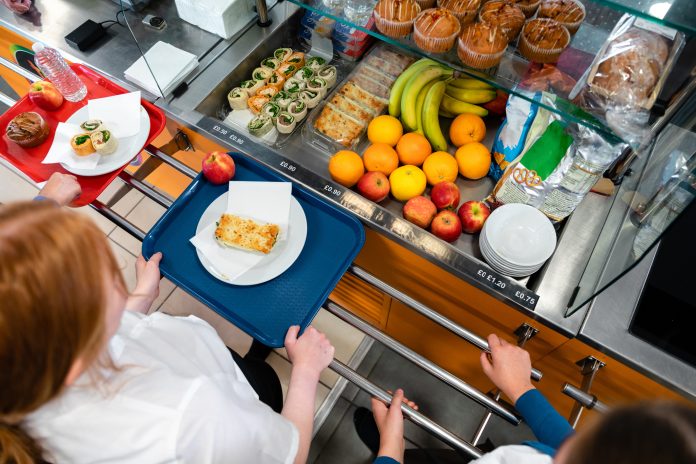In just under 12 months, the government will deliver the biggest expansion of eligibility for Free School Meals in England in a decade. But how can free school meals deliver for the UK farming economy?
According to government published figures, expanding free school meals to all children from families in receipt of Universal Credit in England will mean that, in the first year, an additional 620,000 children (and possibly more) become eligible to receive a free lunch at school every day. Together with the rollout of free school meals already taking place across Wales, Scotland and London, the next few years are now certain to see billions more meals being served in schools.
50% of public sector food in England to be sourced locally
Alongside this, the Labour government has pledged to ensure at least 50% of public sector food in England is sourced locally, sustainably or from British farmers. Before he moved into his new role in housing, communities and local government, the former DEFRA Secretary of State Steve Reed MP said this was so that “we can use the Government’s own purchasing power to back British produce wherever we can. This means British farmers and producers can compete for a fairer share of the £5 billion a year the public sector spends on food. That’s money straight into farmers’ bank accounts to boost turnover and boost profits.”
School food makes up an estimated 60% of this spend. This far outweighs the money spent in other public services such as hospitals, care homes and prisons, which all operate universal free meal access, regardless of socioeconomic background, unlike the means-tested system that exists in England for all pupils after Key Stage 1. It’s a sizeable chunk of taxpayer money, and it is absolutely right that it is spent in a way that maximises its impact.
A £1.91 return on investment for every £1 spent on school meals
Recent research from UCL suggests that school meals are more than a nutritional safety net; they can act as a powerful lever for economic growth, sustainable farming, and healthier communities. Previous cost-benefit analysis by Impact on Urban Health suggested a potential £1.91 return on investment for every £1 spent on school meals.
That’s why, together with school food experts Bremner & Co, we at Sustain set out to understand the potential value of school meal procurement in relation to British farming – in essence to ‘follow the carrot’ from school plate to farm gate.
We found clear evidence that it is possible for school meals to act as a lever for food system-wide benefits and potentially drive a whopping £600 million boost to UK farming. Our analysis reveals that universal school meals in England could increase the annual number of meals served from 1 billion to 1.54 billion – an extra 540 million plates of food every year. If just one meal per week contained a portion of carrots, in line with School Food Standards, the volumes equate to 1,540 ten-tonne lorries delivering to schools and an estimated £18 million worth of carrot sales alone for farmers. For potato farmers, we’re talking around £250 million sales per annum, or 7.8 million 25-kilogram sacks of British spuds.
However, to be sure of the data, we need much greater transparency over how our public sector food is currently being procured, as well as stronger standards applying not just to the nutritional value of school meals, but also their sourcing.
Delivering for kids and UK farmers
School meals also need to be funded in a way that agro-ecological farmers, SMEs, and local supply chains can access and compete for, and which deliver value for the school and the producer. This was brought clearly into focus in interviews with school caterers and local authority food procurement leads. In Blackpool schools, catering lead Derek Wright has successfully switched from imported frozen mash to using locally grown fresh Lancashire potatoes, saving money on ingredient sourcing and reinvesting it in school kitchens and staff training. In Wales, a scheme to deliver Welsh veg into primary schools has required the building up of the supply base, working with local farmers, wholesalers and businesses.
With a cross-government food strategy now underway, there’s an opportunity to take these approaches and solutions and scale them up. By connecting the school food system dots between education, health, local government and food and farming departments, there’s a potential win-win-win for children’s health, farmer livelihoods, and wider economic growth, food security and climate resilience. The DfE and DHSC are already collaborating on a review of the current school food standards to bring them into line with the latest nutritional guidance, ensuring healthy, minimally processed meals with plenty of fresh vegetables, fruits, and pulses align with the government’s aim to create the healthiest generation of children ever. However, the current DEFRA-led Government Buying Standards Framework for food is not mandated across the school food system. This also needs to be addressed, along with school meal funding rates, to support better sourcing of the produce on the school plate.
An encouraging sign following the ministerial reshuffle came when new DEFRA Secretary of State Emma Reynolds immediately took up the opportunity to address the NFU on the occasion of #BackBritishFarming day in September. Farmers we spoke to throughout our research were enthusiastic about the opportunities to provide more food for the nation’s school children. David Simmons of Riviera Produce in Cornwall, who produces broccoli, cauliflower and kale, says, “Great British healthy brassicas offer huge potential, with the right encouragement, to supply into schools and support giving children a healthy start to life. There’s such huge growth potential too – we’re currently missing a trick!”
The current food strategy is a great opportunity to leverage the full value of school food procurement to create a good food cycle, with the best of sustainable British farming at its heart, and a healthy dose of British carrots on every school plate in the country. Sourcing from domestic farmers, producers, and businesses is already a key factor in the sustainability, economic viability, and success of universal school meals in other countries, including Brazil and India.
We can turn 540 million extra school meals into a win-win for kids, farmers and the planet
As chef and food campaigner Hugh Fearnley-Whittingstall says: “Expanding free school meals isn’t just about filling plates, it’s about filling them with fresh, sustainable, home-grown produce that supports children’s health and strengthens our farming economy. “With the right investment and leadership, we can turn 540 million extra school meals into a win-win for kids, farmers and the planet.”











